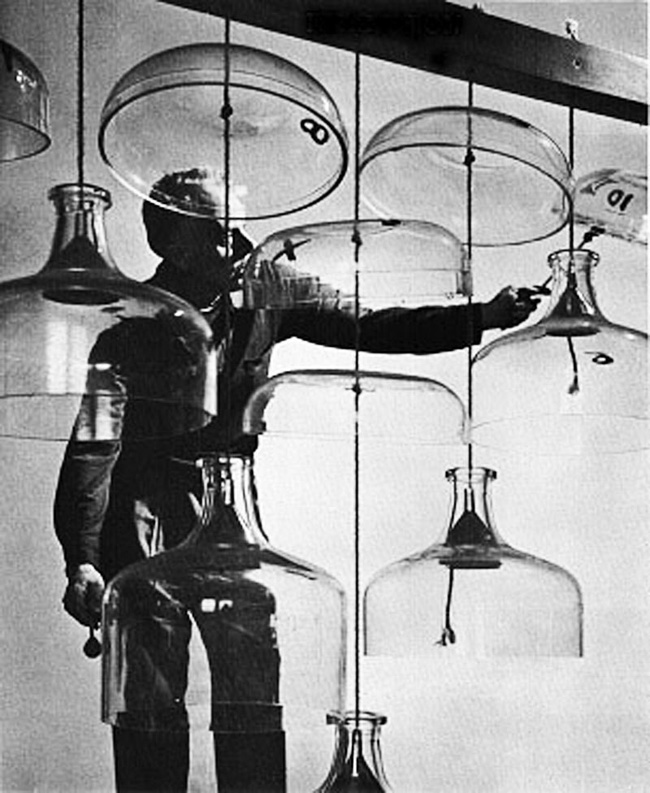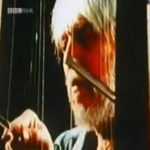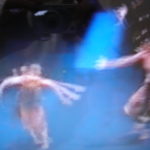Harry Partch, leader of WilderUtopia’s list of Geo-Fauvist (wild-earth) composers, and 20th Century pioneer in working systematically with microtonal scales, also built custom-made instruments in these tunings on which to play his compositions. Watch the documentary The Outsider, The Story of Harry Partch.
Director: Darren Chesworth
Year: 2002
Time: 59 mins
Music: Harry Partch
THE OUTSIDER: THE STORY OF HARRY PARTCH (2002)
Published By Eye of Sound
His obsession with the subjective human voice and the musicality of speech; his partly relativistic deconstruction of the twelve-note scale as an arbitrary straitjacket; his ethnographic sensibility towards different modes of conceiving language, tuning and existence; his need to create channels suited for his new microtonal chromatic universe; his expansion into convergent fields of expression such as film, theatre and dance; and his desire to capture the vernacular as a locus for the textures of being – all these probably make Harry Partch’s the most encompassing of modern creative utopias.
Such an overarching project of existence and creation, obviously, could hardly be comprised in an one-hour documentary, and it would take a considerable amount of creativity and an unflinching focus to cast a shadow of justice over Partch’s (June 24, 1901 — September 3, 1974) vision in such a short time. One aspect that could have been jettisoned is, as usual, the biographic mode, the linear movement from A to Z that suggests apparently logic explanations and connections for processes and objects that are far from logical and linear, supported by an invisible voice-over narration that simulates contextualization and sequence.
Partch, the most extreme of American mavericks, lived much of his life in obscurity and near-poverty, patched together an existence with short-term academic gigs, foundation grants, and private gifts. He was driven to control his artistic works by creating his own set of instruments (magnificently eccentric objects, mostly struck, plucked, and slapped, with names like Marimba Eroica, Cry-Chord, Chromelodeon, and Spoils of War), which employed exotic scales that divided the octave into forty-three degrees. — Russell Platt, The New Yorker
STORY: Bitter Music in Natural Acoustics with Harry Partch


Narrative becomes a form of containment and disambiguation: Partch’s struggle with devitalized modes of composition and the 12-tone octave is all of a sudden brought into light by the reading of one single book, On the Sensation of Tone by H. Helmholtz, and his “discovery” of the arbitrary nature of the Western scale smoothly harmonized with his several inner and outer “deviances,” sexuality included; inversely, Partch’s long-celebrated and romanticized decision to follow a hobo trail for almost a decade is simply glossed as a reaction to the Great Depression and left strangely disconnected from the surrounding acts.
STORY: Harry Partch: Genesis of a Musical Outsider
There are the usual statements by friends, patrons and composers, such as Lou Harrison, Gavin Bryars, John Schneider, Phillip Blackburn, and Philip Glass, adding very little to our understanding of Partch’s universe, and it is from biographers and archivists that the most illuminating comments stem from. While the focus on the apparent eccentricity of the man seems to be a fruitless compromise with the conventions of current personality cults — including a minor polemic with John Cage to boot — it is not surprising that the most rewarding sections focus on the technical aspects of his work, microtonality being efficiently summarised but perhaps not fully explored in its symbolic reach.
The eclipse of “the truth of just intonation” was seen by Partch as a conspiracy in which “pure” musical structures had been corrupted and dilluted by a powerful but stifling hierarchical model, one that curtailed freedom and fostered forms of conformism. This supposedly pure tuning of ancient Greek tradition, which Partch tried to build into his microtonal edifice, and its promises of a wider access to the the truth that is supposed to inhere in the human voice, holds some of the keys for the composer’s universe: a romantic search for a temps perdu, thought to be found both in ancient traditions and non-Western contemporary societies, guided, as ever, by a subversive desire to implode homeland strictures. — Eye of Sound
H-T UbuWeb














Thanks, Mark. I’m just trying to figure out if the Bjork piece is just flash or does it have actual meaning? Haven’t seen it yet, of course.
Mark Morris: Check out “Bjork: Biophilia Live” on Hulu Plus or on line if you haven’t seen it yet. http://m.imdb.com/video/imdb/vi561163289
Pingback: Generation Anthropocene: Altered Planet, Wild Literature | WilderUtopia.com